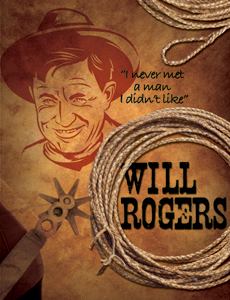Will Rogers
Doug Carlson says the nation could learn much from this iconic humorist and political commentator.


Like a lot of boys of his generation, Doug Carlson grew up admiring the legendary cowboy Will Rogers. He could ride and rope better than anyone else; he was strong and humorous; and, to Carlson, he was downright “impressive.”
Decades later, the president of Dolphin Pool Supply & Service in Frisco, Texas, still admires Rogers, but for entirely different reasons.
“Will Rogers was a down-home individual,” Carlson says. “What you saw was truly what you got. We can all learn a lot from him.”
Born in 1879 in rural Oklahoma, Rogers was a Cherokee-American cowboy, comedian, political commentator, vaudeville performer, writer and actor. By the mid-1930s, he was the top-paid movie star of his time.
After quitting school in the 10th grade to become a cowboy, Rogers was soon bitten by the travel bug and set out for Argentina, where he tried — and failed — at starting his own ranch. More travel followed, and eventually Rogers began his show business career working as a trick roper for a number of Wild West shows, then landed in vaudeville.
When it came to roping, he had a gift. In fact, Rogers was recognized by the Guinness World Records for being able to throw three lassos at once — one to catch the galloping horse’s neck, the second looping around the rider, and the third coming up from under the horse to snag all four of its legs.
But over time an interesting thing happened.
While spinning a rope, Rogers often made witty remarks about the events of the day, especially politics. Soon audiences started lining up specifically to hear the cowboy’s amusing, homespun observations. Amazingly, Rogers never planned what he would say beforehand. Instead, he just read the newspaper on the day of his act and relied on natural comedic ability.
“We’ve all got to be able to inject a little bit of humor into the everyday,” Carlson says. “We can try to go about our business in a friendly and pleasing manner. When we are upbeat and ready to serve our customers, it makes all the difference in the world.”
Though Rogers gained considerable notoriety on the stage, his true fame came with the advent of film. He often played roles that utilized his down-home personality, such as a country bumpkin or a hapless man trying get by in a complex modern world.
But worldwide fame did not affect his values. “I’m not a real movie star,” Rogers quipped. “I’ve still got the same wife I started out with 28 years ago.”
During this time, Rogers became a columnist for newspapers around the nation and began writing books. His insights into American culture often were inspired by a longing for a slower, happier and more moral past. Rogers’ comical distrust of politicians and corporate businessmen endeared him to millions, including then-President Franklin Roosevelt.
“His humor and his comments were always kind,” the president said. “His was not biting sarcasm that hurt the highest or the lowest of his fellow citizens. When he wanted people to laugh out loud, he used the method of pure fun. And when he wanted to make a point for the good of mankind, he used the kind of gentle irony that left no scars behind it.”
More than 70 years later, Carlson sees it similarly. Rogers’ lack of pretension and strong ethics make him a very different kind of role model than today’s tabloid stars, he says. “If you surround yourself with losers, you’ll be a loser. Just like if you surround yourself with good people who have good business sense, that will rub off, too.”
Will Rogers’ life was cut tragically short when he died in a plane crash at age 55.
The nation mourned, shocked by the news. Even today, Rogers remains the quintessential example of a great and patriotic American.
His most famous quote, “I never met a man I didn’t like,” was his credo of genuine love and respect for all humanity and people everywhere.

